中国四大传统节日英文介绍
介绍中国传统节日的英语作文10篇
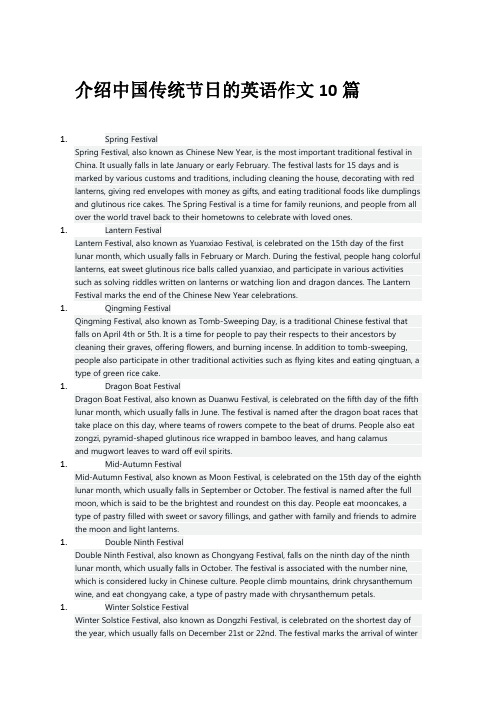
介绍中国传统节日的英语作文10篇1.Spring FestivalSpring Festival, also known as Chinese New Year, is the most important traditional festival in China. It usually falls in late January or early February. The festival lasts for 15 days and ismarked by various customs and traditions, including cleaning the house, decorating with red lanterns, giving red envelopes with money as gifts, and eating traditional foods like dumplings and glutinous rice cakes. The Spring Festival is a time for family reunions, and people from all over the world travel back to their hometowns to celebrate with loved ones.ntern FestivalLantern Festival, also known as Yuanxiao Festival, is celebrated on the 15th day of the first lunar month, which usually falls in February or March. During the festival, people hang colorful lanterns, eat sweet glutinous rice balls called yuanxiao, and participate in various activities such as solving riddles written on lanterns or watching lion and dragon dances. The Lantern Festival marks the end of the Chinese New Year celebrations.1.Qingming FestivalQingming Festival, also known as Tomb-Sweeping Day, is a traditional Chinese festival that falls on April 4th or 5th. It is a time for people to pay their respects to their ancestors bycleaning their graves, offering flowers, and burning incense. In addition to tomb-sweeping, people also participate in other traditional activities such as flying kites and eating qingtuan, a type of green rice cake.1.Dragon Boat FestivalDragon Boat Festival, also known as Duanwu Festival, is celebrated on the fifth day of the fifth lunar month, which usually falls in June. The festival is named after the dragon boat races that take place on this day, where teams of rowers compete to the beat of drums. People also eat zongzi, pyramid-shaped glutinous rice wrapped in bamboo leaves, and hang calamusand mugwort leaves to ward off evil spirits.1.Mid-Autumn FestivalMid-Autumn Festival, also known as Moon Festival, is celebrated on the 15th day of the eighth lunar month, which usually falls in September or October. The festival is named after the full moon, which is said to be the brightest and roundest on this day. People eat mooncakes, a type of pastry filled with sweet or savory fillings, and gather with family and friends to admire the moon and light lanterns.1.Double Ninth FestivalDouble Ninth Festival, also known as Chongyang Festival, falls on the ninth day of the ninth lunar month, which usually falls in October. The festival is associated with the number nine, which is considered lucky in Chinese culture. People climb mountains, drink chrysanthemum wine, and eat chongyang cake, a type of pastry made with chrysanthemum petals.1.Winter Solstice FestivalWinter Solstice Festival, also known as Dongzhi Festival, is celebrated on the shortest day of the year, which usually falls on December 21st or 22nd. The festival marks the arrival of winterand the beginning of longer days. People eat tangyuan, glutinous rice balls filled with sweet or savory fillings, and make offerings to ancestors and deities.1.Ghost FestivalGhost Festival, also known as Hungry Ghost Festival, falls on the 15th day of the seventh lunar month, which usually falls in August or September. The festival is a time to pay respects to the deceased and appease wandering ghosts. People offer food, incense, and paper money to the ghosts and perform traditional rituals to ward off bad luck.ba FestivalLaba Festival falls on the eighth day of the twelfth lunar month, which usually falls in January.The festival is named after the porridge, or laba porridge, that is traditionally eaten on this day.The porridge is made with rice, beans, and various nuts and fruits, and is believed to bring good luck and fortune for the coming year.1.Zhongyuan FestivalZhongyuan Festival, also known as Ghost Month, is a month-long festival that falls on the fifteenth day of the seventh lunar month, which usually falls in August or September. Thefestival is similar to the Ghost Festival, but is a more extended period of time where people pay respects to the deceased and offer food, incense, and paper money to the ghosts. People also perform traditional rituals to ward off bad luck during this time。
中国传统节日的英语作文【优秀4篇】
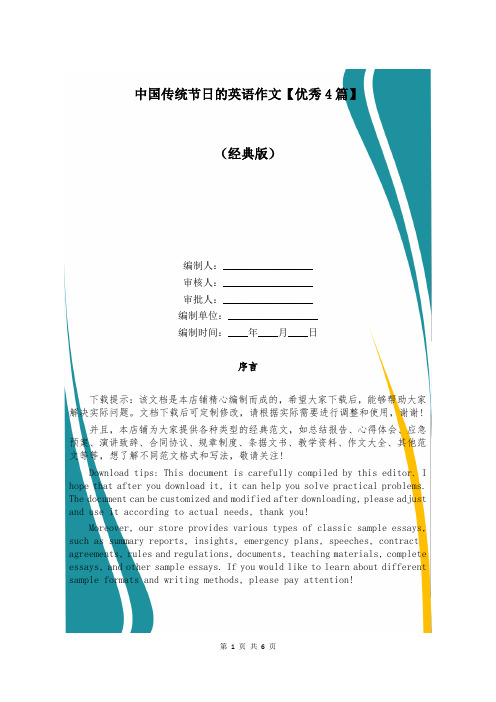
中国传统节日的英语作文【优秀4篇】(经典版)编制人:__________________审核人:__________________审批人:__________________编制单位:__________________编制时间:____年____月____日序言下载提示:该文档是本店铺精心编制而成的,希望大家下载后,能够帮助大家解决实际问题。
文档下载后可定制修改,请根据实际需要进行调整和使用,谢谢!并且,本店铺为大家提供各种类型的经典范文,如总结报告、心得体会、应急预案、演讲致辞、合同协议、规章制度、条据文书、教学资料、作文大全、其他范文等等,想了解不同范文格式和写法,敬请关注!Download tips: This document is carefully compiled by this editor. I hope that after you download it, it can help you solve practical problems. The document can be customized and modified after downloading, please adjust and use it according to actual needs, thank you!Moreover, our store provides various types of classic sample essays, such as summary reports, insights, emergency plans, speeches, contract agreements, rules and regulations, documents, teaching materials, complete essays, and other sample essays. If you would like to learn about different sample formats and writing methods, please pay attention!中国传统节日的英语作文【优秀4篇】根据中文大意和英语提示词语,写出意思连贯、符合逻辑、不少于60词的短文。
中国传统节日英语知识
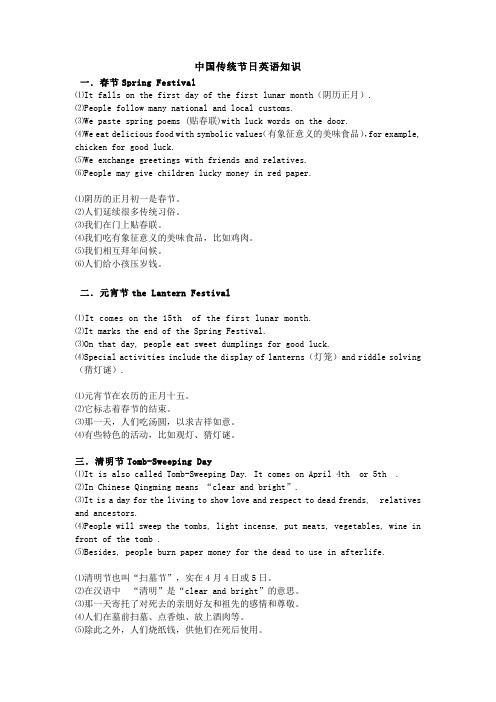
中国传统节日英语知识一.春节Spring Festival⑴It falls on the first day of the first lunar month(阴历正月).⑵People follow many national and local customs.⑶We paste spring poems (贴春联)with luck words on the door.⑷We eat delicious food with symbolic values(有象征意义的美味食品),for example, chicken for good luck.⑸We exchange greetings with friends and relatives.⑹People may give children lucky money in red paper.⑴阴历的正月初一是春节。
⑵人们延续很多传统习俗。
⑶我们在门上贴春联。
⑷我们吃有象征意义的美味食品,比如鸡肉。
⑸我们相互拜年问候。
⑹人们给小孩压岁钱。
二.元宵节the Lantern Festival⑴It comes on the 15th of the first lunar month.⑵It marks the end of the Spring Festival.⑶On that day, people eat sweet dumplings for good luck.⑷Special activities include the display of lanterns(灯笼)and riddle solving (猜灯谜).⑴元宵节在农历的正月十五。
⑵它标志着春节的结束。
⑶那一天,人们吃汤圆,以求吉祥如意。
⑷有些特色的活动,比如观灯、猜灯谜。
三.清明节Tomb-Sweeping Day⑴It is also called Tomb-Sweeping Day. It comes on April 4th or 5th .⑵In Chinese Qingming means “clear and bright”.⑶It is a day for the living to show love and respect to dead frends, relatives and ancestors.⑷People will sweep the tombs, light incense, put meats, vegetables, wine in front of the tomb .⑸Besides, people burn paper money for the dead to use in afterlife.⑴清明节也叫“扫墓节”,实在4月4日或5日。
中国传统节日英文介绍

Qing Ming
Du Mu( Tang Dynasty )
Qing Ming usually comes with rainy days
பைடு நூலகம்
清明时节雨纷纷, 路上行人欲断魂, 借问酒家何处有, 牧童遥指杏花村.
I ask a Buffalo boy for tavern ['tævən] to release my sadness Passengers on the way are full of soreness
He points to the village covered by apricot ['eiprikɔt] blossoms
Chinese Valentine’s Day
The seventh day of the seventh month of the lunar calendar is known as Qi Xi Jie or Qiqiao Jie, a traditional holiday that has been recently called China's Valentine's Day.
In China, the most traditional and popular Spring Festival food is dumpling, which looks like the moon with vegetables and meat mixed in it. The Chinese name of dumpling is “JIAO ZI”, ”JIAO” means ”cross”, ”ZI” is Chinese traditional time represents “24:00”, so the Chinese word “JIAO ZI” means “cross 24:00”, just the dividing point of last year and next year. So when it comes to 24:00, every family begins eating dumplings.
中国四大传统节日英文介绍
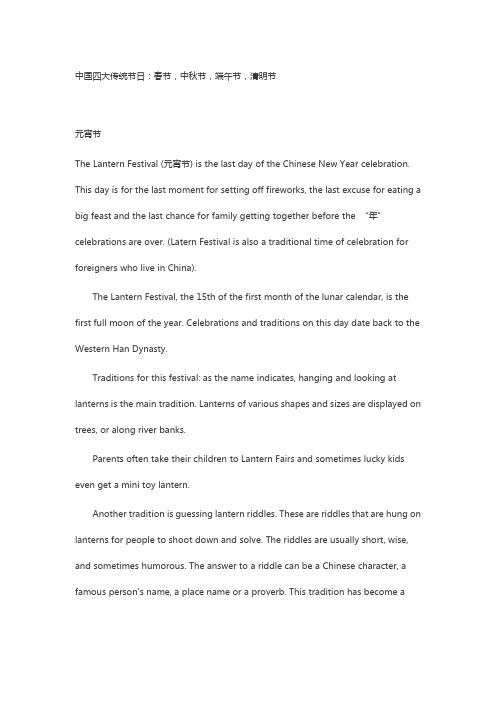
中国四大传统节日:春节,中秋节,端午节,清明节元宵节The Lantern Festival (元宵节) is the last day of the Chinese New Year celebration. This day is for the last moment for setting off fireworks, the last excuse for eating a big feast and the last chance for family getting together before the “年”celebrations are over. (Latern Festival is also a traditional time of celebration for foreigners who live in China).The Lantern Festival, the 15th of the first month of the lunar calendar, is the first full moon of the year. Celebrations and traditions on this day date back to the Western Han Dynasty.Traditions for this festival: as the name indicates, hanging and looking at lanterns is the main tradition. Lanterns of various shapes and sizes are displayed on trees, or along river banks.Parents often take their children to Lantern Fairs and sometimes lucky kids even get a mini toy lantern.Another tradition is guessing lantern riddles. These are riddles that are hung on lanterns for people to shoot down and solve. The riddles are usually short, wise, and sometimes humorous. The answer to a riddle can be a Chinese character, a famous person's name, a place name or a proverb. This tradition has become apopular game with serious staying power even as social development changes other traditions.Other than that, the most important thing to do today is to eat sweet dumplings. In northern China, sweet dumplings made of glutinous rice flour are called “元宵”while in southern part they are called “汤圆”. Typical sweet dumplings are filled with black sesame sauce, sweetened bean paste, or hawthorn. Making “元宵”today is like a game or an activity, so it's seldom done without a reason and a group of friends or family present to help out.端午节The Dragon Boat Festival, also called the Duanwu Festival, is celebrated on the fifth day of the fifth month according to the Chinese calendar. For thousands of years, the festival has been marked by eating zong zi (glutinous rice(糯米)wrapped to form a pyramid using bamboo or reed leaves) and racing dragon boats.The festival is best known for its dragon-boat races, especially in the southern provinces where there are many rivers and lakes. Thisregatta(赛舟会)commemorates the death of Qu Yuan , an honest minister who is said to have committed suicide by drowning himself in a river. Qu was a minister of the State of Chu situated in present-day Hunan and Hubei provinces, during theWarring States Period(475-221BC)(战国时期). He was upright, loyal and highly esteemed for his wise counsel that brought peace and prosperity to the state. However, when a dishonest and corrupt prince vilified Qu, he was disgraced and dismissed from office. Realizing that the country was now in the hands of evil and corrupt officials, Qu grabbed a large stone and leapt into the Miluo River on the fifth day of the fifth month. Nearby fishermen rushed over to try and save him but were unable to even recover his body. Thereafter, the state declined and was eventually conquered by the State of Qin.The people of Chu who mourned the death of Qu threw rice into the river to feed his ghost every year on the fifth day of the fifth month. But one year, the spirit of Qu appeared and told the mourners that a hugereptile(爬行动物)in the river had stolen the rice. The spirit then advised them to wrap the rice in silk and bind it with five different-colored threads before tossing it into the river.During the Duanwu Festival, a glutinous rice pudding called zong zi is eaten to symbolize the rice offerings to Qu. Ingredients such as beans,lotus seeds(莲子),chestnuts(栗子), pork fat and the golden yolk of a salted duck egg are often added to the glutinous rice. The pudding is then wrapped with bamboo leaves, bound with a kind of raffia and boiled in salt water for hours.The dragon-boat races symbolize the many attempts to rescue and recover Qu's body. A typical dragon boat ranges from 50-100 feet in length, with a beam of about 5.5 feet, accommodating two paddlers seated side by side.A wooden dragon head is attached at the bow, and a dragon tail at thestern(船尾). A banner hoisted on a pole is also fastened at the stern and the hull is decorated with red, green and blue scales edged in gold. In the center of the boat is a canopied shrine behind which the drummers,gong(铜锣)beaters andcymbal(铙钹)players are seated to set the pace for the paddlers. There are also men positioned at the bow to set off firecrackers, toss rice into the water and pretend to be looking for Qu. All of the noise and pageantry creates an atmosphere of gaiety and excitement for the participants and spectators alike. The races are held among different clans, villages and organizations, and the winners are awarded medals, banners, jugs of wine and festive meals.清明节Qing Ming is a time to remember the dead and the dearly departed. More important, it is a period to honour and to pay respect to one's deceased ancestors and family members. Because it reinforces the ethic of filial piety, Qing Ming is a major Chinese festival. Literally meaning "clear" (Qing) and "bright" (Ming), this Chinese festival falls in early spring, on the 106th day after the winter solstice. It is a "spring" festival, and it is an occasion for the whole family to leave the home and to sweep the graves of their forebears. Chinese being practical people this sweeping of the graves is given an extended period, that is, 10 days before and after Qing Ming day. Among some dialect groups a whole month is allocated. 清明节是一个纪念祖先的节日。
中国传统节日介绍英文版

中国传统节日介绍英文版.元旦 New Year' s Day Jan.1国际劳动妇女节 International Working women' s Day(wornen's Day) Mar.8国际劳动节 nternatlonal Labor Day(May. Day) May.1中国青年节 Chinese Youth Day May.4国际儿童节 International Children's Day(Children's Day) June .1中国共产党诞生纪念日( 党的生日) Anniversary of the Foundlng of the ChineseCommunist Party ( the Party' s Birthday) July .1建军节 Army Day August .1教师节 Teachers , Day Sept.1国庆节 National Dey October.1中国传统节日春节 the Sprlng Festival ( NewYearls Day of the Chinese lunar calendar)农历正月初一元宵节(灯节) the Lantern Festival 农历正月十五清明节 the Qing Ming Festival 四月五日前后端午节 the Dragon-Boat Festiva 农历五月初五中秋节 the MidAutumn Festival(the Moon Festival)农历八月十五重阳节 the Double Ninth Festival 农历九月初九元旦(1月1日)NewYear'sDay春节(农历一月一日)theSpringFestival元宵节(农历一月十五日)theLanternFestival国际劳动妇女节(3月8日)InternationalWorkingWomen'sDay植树节(3月12日)ArborDay邮政节(3月20日)PostalDay世界气象节(3月23日)WorldMeteorologyDay清明节(4月5日)ChingMingFestival;Tomb-sweepingFestival国际劳动节(5月1日)InternationalLabourDay中国青年节(5月4日)ChineseYouthDay护士节(5月12日)Nurses'Festival端午节(农历五月初五)theDragonBoatFestival国际儿童节(6月1日)InternationalChildren'sDay中国共产党成立纪念日(7月1日)theParty'sBirthday建军节(8月1日)theArmy'sDay中秋节(农历八月十五)Mid-autumn(Moon)Festival教师节(9月10日)Teachers'Day重阳节(农历九月九日)Double-ninthDay国庆节(10月1日)NationalDay除夕(农历十二月三十日)NewYear'sEve阳历节日1月1日元旦(New Year's Day)2月2日世界湿地日(World Wetlands Day)2月14日情人节(Valentine's Day)3月3日全国爱耳日3月5日青年志愿者服务日3月8日国际妇女节(International Women' Day)3月9日保护母亲河日3月12日中国植树节(China Arbor Day)3月14日白色情人节(White Day)3月14日国际警察日(International Policemen' Day)3月15日世界消费者权益日(World Consumer Right Day)3月21日世界森林日(World Forest Day)3月21日世界睡眠日(World Sleep Day)3月22日世界水日(World Water Day)3月23日世界气象日(World Meteorological Day)3月24日世界防治结核病日(World Tuberculosis Day)4月1日愚人节(April Fools' Day)4月5日清明节(Tomb-sweeping Day)4月7日世界卫生日(World Health Day)4月22日世界地球日(World Earth Day)4月26日世界知识产权日(World Intellectual Property Day)5月1日国际劳动节(International Labour Day)5月3日世界哮喘日(World Asthma Day)5月4日中国青年节(Chinese Youth Day)5月8日世界红十字日(World Red-Cross Day)5月12日国际护士节(International Nurse Day)5月15日国际家庭日(International Family Day)5月17日世界电信日(World Telecommunications Day)5月20日全国学生营养日5月23日国际牛奶日(International Milk Day)5月31日世界无烟日(World No-Smoking Day)6月1日国际儿童节(International Children's Day)6月5日世界环境日(International Environment Day)6月6日全国爱眼日6月17日世界防治荒漠化和干旱日(World Day to combat desertification)6月23日国际奥林匹克日(International Olympic Day)6月25日全国土地日6月26日国际禁毒日(International Day Against Drug Abuse and IllicitTrafficking)7月1日中国共产党诞生日(Anniversary of the Founding of the Chinese Communist Party)7月1日国际建筑日(International Architecture Day)7月7日中国人民抗日战争纪念日7月11日世界人口日(World Population Day)8月1日中国人民解放军建军节(Army Day)8月12日国际青年节(International Youth Day)9月8日国际扫盲日(International Anti-illiteracy Day)9月10日中国教师节(Teacher's Day)9月16日中国脑健康日9月16日国际臭氧层保护日(International Day for the Preservation of the Ozone Layer)9月20日全国爱牙日9月21日世界停火日(World Cease-fire Day)9月27日世界旅游日(World Tourism Day)10月1日中华人民共和国国庆节(National Day)10月1日国际音乐日(International Music Day)10月1日国际老年人日(International Day of Older Persons)10月4日世界动物日(World Animal Day)10月5日世界教师日(World Teachers' Day)(联合国教科文组织确立)10月8日全国高血压日10月9日世界邮政日(World Post Day)10月10日世界精神卫生日(World Mental Health Day)10月14日世界标准日(World Standards Day)10月15日国际盲人节(International Day of the Blind)10月15日世界农村妇女日(World Rural Women's Day)10月16日世界粮食日(World Food Day)10月17日国际消除贫困日(International Day for the Eradication of Poverty) 10月24日联合国日(United Nations Day)10月24日世界发展新闻日(World Development Information Day)10月28日中国男性健康日10月29日国际生物多样性日(International Biodiversity Day)10月31日万圣节(Halloween)11月8日中国记者节11月9日消防宣传日11月14日世界糖尿病日(World Diabetes Day)11月17日国际大学生节11月25日国际消除对妇女的暴力日(International Day For the elimination of Violence against Women)12月1日世界爱滋病日(World AIDS Day)12月3日世界残疾人日(World Disabled Day)12月4日全国法制宣传日12月9日世界足球日(World Football Day)12月25日圣诞节(Christmas Day)12月29日国际生物多样性日(International Biological Diversity Day)1月最后一个星期日国际麻风节3月最后一个完整周的星期一中小学生安全教育日春分月圆后的第一个星期日复活节(Easter Monday)(有可能是3月22-4月25日间的任一天)5月第二个星期日母亲节(Mother's Day)5月第三个星期日全国助残日6月第三个星期日父亲节(Father's Day)9月第三个星期二国际和平日(International Peace Day)9月第三个星期六全国国防教育日9月第四个星期日国际聋人节(International Day of the Deaf)10月的第一个星期一世界住房日(World Habitat Day)10月的第二个星斯一加拿大感恩节(Thanksgiving Day)10月第二个星期三国际减轻自然灾害日(International Day for Natural Disaster Reduction)10月第二个星期四世界爱眼日(World Sight Day)11月最后一个星期四美国感恩节(Thanksgiving Day)农历节日农历正月初一春节(the Spring Festival)农历正月十五元宵节(Lantern Festival)农历五月初五端午节(the Dragon-Boat Festival)农历七月初七乞巧节(中国情人节)(Double-Seventh Day)农历八月十五中秋节(the Mid-Autumn Festival)农历九月初九重阳节(the Double Ninth Festival)农历腊月初八腊八节(the laba Rice Porridge Festival)农历腊月二十四传统扫房日。
中国传统节日英文介绍
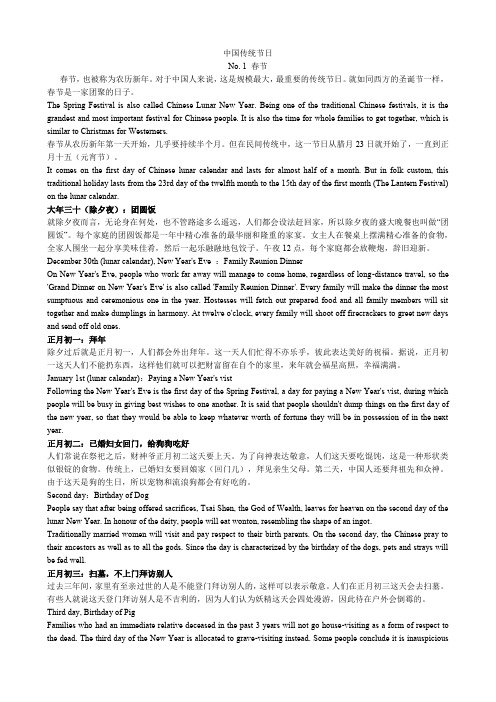
中国传统节日No. 1 春节春节,也被称为农历新年。
对于中国人来说,这是规模最大,最重要的传统节日。
就如同西方的圣诞节一样,春节是一家团聚的日子。
The Spring Festival is also called Chinese Lunar New Year. Being one of the traditional Chinese festivals, it is the grandest and most important festival for Chinese people. It is also the time for whole families to get together, which is similar to Christmas for Westerners.春节从农历新年第一天开始,几乎要持续半个月。
但在民间传统中,这一节日从腊月23日就开始了,一直到正月十五(元宵节)。
It comes on the first day of Chinese lunar calendar and lasts for almost half of a month. But in folk custom, this traditional holiday lasts from the 23rd day of the twelfth month to the 15th day of the first month (The Lantern Festival) on the lunar calendar.大年三十(除夕夜):团圆饭就除夕夜而言,无论身在何处,也不管路途多么遥远,人们都会设法赶回家,所以除夕夜的盛大晚餐也叫做“团圆饭”。
每个家庭的团圆饭都是一年中精心准备的最华丽和隆重的家宴。
女主人在餐桌上摆满精心准备的食物,全家人围坐一起分享美味佳肴,然后一起乐融融地包饺子。
午夜12点,每个家庭都会放鞭炮,辞旧迎新。
中国四大传统节日介绍【英语】

Spring FestivalThe Spring Festival is a traditional cultural circle Chinese characters on the lunar new year, known as "new year". But also called the degree of verbal and celebrate the new year, Chinese New year. Chinese people have more than 4000 years of history during the spring festival. Usually at least until the fifteen (Spring Festival) new year is over, in the folk, the Spring Festival is a traditional sense from the twelfth lunar month the Greek Festival or the twelfth lunar month twenty-three or twenty-four people, until the nineteen.Mid-Autumn FestivalThe mid autumn festival began in the early Tang Dynasty, prevailed in the Song Dynasty, and became one of the traditional Chinese festivals along with the spring festival. Influenced by Chinese culture, the Mid Autumn Festival is also a traditional festival in some countries of East Asia and Southeast Asia, especially the local Chinese and overseas chinese. The Mid Autumn Festival has the festival, moon, moon, moon cake to eat and drink, enjoy the sweet scented osmanthus osmanthus wine custom, spread so far, prolonged.Dragon Boat FestivalThe Dragon Boat Festival because of Chu in the Warring States period (now Hubei) poet Qu Yuan on the day with a stone Tiaomi Luojiang himself, the ruler to set a patriotic label as the Dragon Boat Festival to commemorate Qu Yuan. Since ancient times, the Dragon Boat Festival is the Dragon Boat Festival and eat dumplings. In May 2006, the State Council will be included in the first batch of national intangible cultural heritage; in September 2009, UNESCO formally considered and approved China Dragon Boat Festival in the world intangible cultural heritage, has become the first in the world's intangible cultural heritage Chinese festival.Tomb-sweeping DayTomb-sweeping Day also called TaQingJie, in mid spring and late spring and summer, which is 108th days after the winter solstice. It is one of the traditional festivals and the most important sacrificial festivals in China. It is also a day for worshipping ancestors and sweeping tombs. The traditional Chinese Tomb-sweeping Day began about Zhou Dai, now has more than 2500 years of history. Qingming is the name of a solar term at the earliest. Usually in the Gregorian calendar before and after April 5th, the feast is very long, there are 10 days ago after 8 days and 10 days before the 10 days after the two claims, the nearly 20 days are Tomb-sweeping Day.。
中国四大传统节日英文介绍分析

中国四大传统节日:春节,中秋节,端午节,清明节元宵节The Lantern Festival (元宵节) is the last day of the Chinese New Year celebration. This day is for the last moment for setting off fireworks, the last excuse for eating abig feast and the last chance for family getting together before the “年”celebrations are over. (Latern Festival is also a traditional time of celebration for foreigners who live in China).The Lantern Festival, the 15th of the first month of the lunar calendar, is thefirst full moon of the year. Celebrations and traditions on this day date back to the Western Han Dynasty.Traditions for this festival: as the name indicates, hanging and looking atlanterns is the main tradition. Lanterns of various shapes and sizes are displayed on trees, or along river banks.Parents often take their children to Lantern Fairs and sometimes lucky kidseven get a mini toy lantern.Another tradition is guessing lantern riddles. These are riddles that are hung on lanterns for people to shoot down and solve. The riddles are usually short, wise,and sometimes humorous. The answer to a riddle can be a Chinese character, a famous person's name, a place name or a proverb. This tradition has become apopular game with serious staying power even as social development changesother traditions.Other than that, the most important thing to do today is to eat sweetdumplings. In northern China, sweet dumplings made of glutinous rice flour arecalled “元宵”while in southern part they are called “汤圆”. Typical sweet dumplings are filled with black sesame sauce, sweetened bean paste, or hawthorn.Making “元宵”today is like a game or an activity, so it's seldom done without areason and a group of friends or family present to help out.端午节The Dragon Boat Festival, also called the Duanwu Festival, is celebrated on the fifth dayof the fifth month according to the Chinese calendar. For thousands of years, the festivalhas been marked by eating zong zi (glutinous rice(糯米)wrapped to form a pyramid using bamboo or reed leaves) and racing dragon boats.The festival is best known for its dragon-boat races, especially in the southern provinces where there are many rivers and lakes. Thisregatta(赛舟会)commemorates the death of Qu Yuan , an honest minister who is said to have committed suicide by drowninghimself in a river. Qu was a minister of the State of Chu situated in present-day Hunan andHubei provinces, during theWarring States Period(475-221BC)(战国时期). He was upright, loyal and highly esteemed for his wise counsel that brought peace and prosperityto the state. However, when a dishonest and corrupt prince vilified Qu, he was disgracedand dismissed from office. Realizing that the country was now in the hands of evil andcorrupt officials, Qu grabbed a large stone and leapt into the Miluo River on the fifth day ofthe fifth month. Nearby fishermen rushed over to try and save him but were unable to even recover his body. Thereafter, the state declined and was eventually conquered bythe State of Qin.The people of Chu who mourned the death of Qu threw rice into the river to feed hisghost every year on the fifth day of the fifth month. But one year, the spirit of Qu appearedand told the mourners that a hugereptile(爬行动物)in the river had stolen the rice. The spirit then advised them to wrap the rice in silk and bind it with five different-colored threads before tossing it into the river.During the Duanwu Festival, a glutinous rice pudding called zong zi is eaten to symbolize the rice offerings to Qu. Ingredients such as beans,lotus seeds(莲子),chestnuts(栗子), pork fat and the golden yolk of a salted duck egg are often addedto the glutinous rice. The pudding is then wrapped with bamboo leaves, bound with a kindof raffia and boiled in salt water for hours.The dragon-boat races symbolize the many attempts to rescue and recover Qu's body. A typical dragon boat ranges from 50-100 feet in length, with a beam of about 5.5feet, accommodating two paddlers seated side by side.A wooden dragon head is attached at the bow, and a dragon tail at thestern(船尾). A banner hoisted on a pole is also fastened at the stern and the hull is decorated with red,green and blue scales edged in gold. In the center of the boat is a canopied shrine behindwhich the drummers,gong(铜锣)beaters andcymbal(铙钹)players are seated to set the pace for the paddlers. There are also men positioned at the bow to set off firecrackers,toss rice into the water and pretend to be looking for Qu. All of the noise and pageantrycreates an atmosphere of gaiety and excitement for the participants and spectators alike.The races are held among different clans, villages and organizations, and the winners areawarded medals, banners, jugs of wine and festive meals.清明节Qing Ming is a time to remember the dead and the dearly departed. More important, itis a period to honour and to pay respect to one's deceased ancestors and family members. Because it reinforces the ethic of filial piety, Qing Ming is a major Chinese festival. Literally meaning "clear" (Qing) and "bright" (Ming), this Chinese festival falls in early spring, on the 106th day after the winter solstice. It is a "spring" festival, and it is an occasion for the whole family to leave the home and to sweep the graves of their forebears. Chinese being practical people this sweeping of the graves is given an extended period, that is, 10 days before and after Qing Ming day. Among some dialectgroups a whole month is allocated. 清明节是一个纪念祖先的节日。
英文版传统节日介绍.
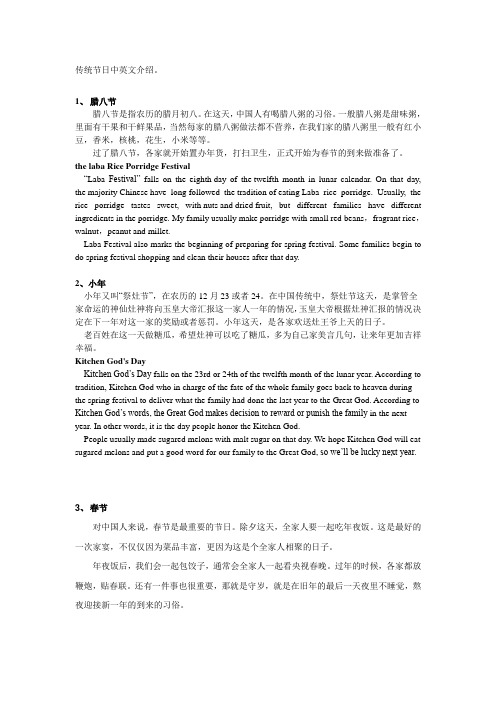
传统节日中英文介绍。
1、腊八节腊八节是指农历的腊月初八。
在这天,中国人有喝腊八粥的习俗。
一般腊八粥是甜味粥,里面有干果和干鲜果品,当然每家的腊八粥做法都不营养,在我们家的腊八粥里一般有红小豆,香米,核桃,花生,小米等等。
过了腊八节,各家就开始置办年货,打扫卫生,正式开始为春节的到来做准备了。
the laba Rice Porridge Festival“Laba Festival” falls on the eighth day of the twelfth month in lunar calendar. On that day, the majority Chinese have long followed the tradition of eating Laba rice porridge. Usually, the rice porridge tastes sweet, with nuts and dried fruit, but different families have different ingredients in the porridge. My family usually make porridge with small red beans,fragrant rice,walnut,peanut and millet.Laba Festival also marks the beginning of preparing for spring festival. Some families begin to do spring festival shopping and clean their houses after that day.2、小年小年又叫“祭灶节”,在农历的12月23或者24。
在中国传统中,祭灶节这天,是掌管全家命运的神仙灶神将向玉皇大帝汇报这一家人一年的情况,玉皇大帝根据灶神汇报的情况决定在下一年对这一家的奖励或者惩罚。
中国传统节日介绍英文版

中国传统节日介绍英文版Chinese Traditional FestivalsChinese culture is rich and diverse, and one of its most distinctive features is its traditional festivals. These festivals, deeply rooted in Chinese history, reflect the customs, beliefs, and values of the Chinese people. In this article, we will introduce some of the most significant Chinese traditional festivals.1. Spring Festival (Chinese New Year)The Spring Festival, also known as Chinese New Year, is the most important and widely celebrated festival in China. It marks the beginning of the lunar calendar and usually falls in January or February. During this festival, families come together for feasts, exchange gifts, and set off fireworks. The highlight of the Spring Festival is the Dragon and Lion Dance, in which performers mimic the movements of these mythical creatures to bring good luck and ward off evil spirits.2. Lantern FestivalThe Lantern Festival marks the end of the Chinese New Year celebrations. It takes place on the fifteenth day of the lunar calendar, symbolizing the first full moon of the year. People hang decorative lanterns, solve riddles written on lanterns, and eat sweet rice dumplings called tangyuan. The skies are adorned with beautiful flying lanterns that create a magical atmosphere.3. Dragon Boat FestivalThe Dragon Boat Festival, also known as Duanwu Festival, is celebrated on the fifth day of the fifth lunar month. This festival commemorates the ancient poet Qu Yuan and commemorates his suicide by drowning himself in a river. Dragon boat races are held to reenact the search for Qu Yuan's body and to pay homage to him. People also eat sticky rice dumplings wrapped in bamboo leaves called zongzi during this festival.4. Mid-Autumn FestivalThe Mid-Autumn Festival, also known as the Moon Festival, is celebrated on the fifteenth day of the eighth lunar month. It is a time for families to gather and appreciate the full moon while eating mooncakes. Mooncakes are traditionally filled with sweet bean paste or lotus seed paste and often contain a salted egg yolk symbolizing the moon. The festival also includes lantern displays and the exchange of small gifts.5. Qingming Festival (Tomb-Sweeping Day)Qingming Festival, also known as Tomb-Sweeping Day, is a time to honor deceased ancestors. It usually occurs on April 4th or 5th of each year. During this festival, families visit the graves of their ancestors to clean and tidy the tombstones, make offerings, and burn incense. It is also a time for people to enjoy outdoor activities such as flying kites and hiking.6. Double Ninth FestivalThe Double Ninth Festival, also known as Chongyang Festival, is celebrated on the ninth day of the ninth lunar month. As the name suggests, this festival falls on a day with a double yang (阳) numerical order, which symbolizes strength and fortune. On this day, people often climb mountains,fly kites, and drink chrysanthemum wine to ward off evil spirits and pray for good health and longevity.7. Winter Solstice FestivalThe Winter Solstice Festival, also known as Dongzhi Festival, is celebrated on the shortest day and longest night of the year, around December 21st. It is a time for families to get together and enjoy a special meal. Tangyuan, a sweet glutinous rice ball, is a traditional food during this festival. Eating tangyuan symbolizes family reunion and the arrival of longer days as we move into winter.In conclusion, Chinese traditional festivals hold great significance in the hearts of the Chinese people, serving as a means to connect with their cultural roots, strengthen family ties, and express their hopes and wishes. The festivals mentioned above are just a glimpse into the rich tapestry of Chinese traditions, each with its unique traditions, customs, and beliefs. By celebrating these festivals, the Chinese people pass down their heritage from generation to generation, ensuring that their cultural identity remains alive and vibrant.。
各种中国传统节日的英文介绍

各种中国传统节日的英文介绍
以下是几个中国传统节日的英文介绍:
1.春节(Spring Festival):春节是中国最重要的传统节日,通常在农历正
月初一庆祝。
这个节日标志着新年的开始,人们会进行一系列的庆祝活动,如贴春联、吃团圆饭、放烟花爆竹等。
2.元宵节(Lantern Festival):元宵节是春节之后的第一个重要节日,通常
在农历正月十五庆祝。
这个节日主要是庆祝春节后的第一个满月,人们会吃元宵、赏花灯、猜灯谜等。
3.清明节(Qingming Festival):清明节是中国传统的祭祀节日,通常在公
历4月4日或5日庆祝。
这个节日是祭祖和扫墓的日子,人们会去祭拜祖先、献上鲜花、焚香等。
4.端午节(Dragon Boat Festival):端午节是中国传统节日之一,通常在农
历五月初五庆祝。
这个节日主要是为了纪念古代爱国诗人屈原,人们会赛龙舟、吃粽子、喝雄黄酒等。
5.中秋节(Mid-Autumn Festival):中秋节是中国传统节日之一,通常在
农历八月十五庆祝。
这个节日是庆祝秋收的日子,人们会赏月、吃月饼、猜灯谜等。
6.重阳节(Double Ninth Festival):重阳节是中国传统节日之一,通常在
农历九月初九庆祝。
这个节日主要是为了祈求长寿和平安,人们会登高、赏菊、吃重阳糕等。
以上是一些中国传统节日的英文介绍,希望能够帮助到您。
中国传统节日的英文介绍

35. 唐三彩:Tri-color Pottery of the Tang Dynasty/ The Tang Tri-colored pottery
36. 中国特色的社会主义:Chinese-charactered Socialist/Socialist with Chinese characteristics
18. 中秋节:Mid-Autumn Day
19. 结婚证:Marriage Certificate
20. 儒家文化:Confucian Culture
21. 附属学校:Affiliated school
22. 古装片:Costume Drama
23. 武打片:Chinese Swordplay Movie
64. 香港澳门同胞:Compatriots from Hong Kong and Macao
65. 文化大革命:Cultural Revolution
66. 长江中下游地区:The Mid-low Reaches of Yangtze River
67. 门当户对:Perfect Match/Exact Matห้องสมุดไป่ตู้h
68. 《水浒》:Water Margin/Outlaws of the Marsh
69. 中外合资企业:Joint Ventures
70. 文房四宝(笔墨纸砚):"The Four Treasure of the Study" "Brush, Inkstick, Paper, and Inkstone",
47. 太极拳:Tai Chi
48. 独生子女证:The Certificate of One-child
中国的传统节日英语作文(精选14篇)
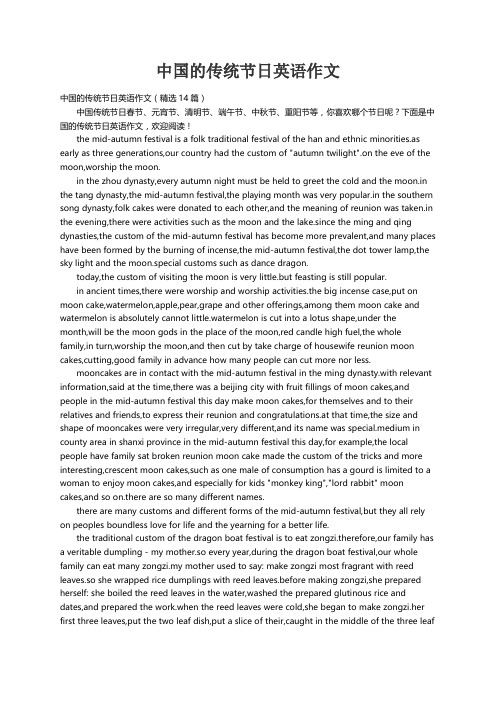
中国的传统节日英语作文中国的传统节日英语作文(精选14篇)中国传统节日春节、元宵节、清明节、端午节、中秋节、重阳节等,你喜欢哪个节日呢?下面是中国的传统节日英语作文,欢迎阅读!the mid-autumn festival is a folk traditional festival of the han and ethnic minorities.as early as three generations,our country had the custom of "autumn twilight".on the eve of the moon,worship the moon.in the zhou dynasty,every autumn night must be held to greet the cold and the moon.in the tang dynasty,the mid-autumn festival,the playing month was very popular.in the southern song dynasty,folk cakes were donated to each other,and the meaning of reunion was taken.in the evening,there were activities such as the moon and the lake.since the ming and qing dynasties,the custom of the mid-autumn festival has become more prevalent,and many places have been formed by the burning of incense,the mid-autumn festival,the dot tower lamp,the sky light and the moon.special customs such as dance dragon.today,the custom of visiting the moon is very little.but feasting is still popular.in ancient times,there were worship and worship activities.the big incense case,put on moon cake,watermelon,apple,pear,grape and other offerings,among them moon cake and watermelon is absolutely cannot little.watermelon is cut into a lotus shape,under the month,will be the moon gods in the place of the moon,red candle high fuel,the whole family,in turn,worship the moon,and then cut by take charge of housewife reunion moon cakes,cutting,good family in advance how many people can cut more nor less.mooncakes are in contact with the mid-autumn festival in the ming dynasty.with relevant information,said at the time,there was a beijing city with fruit fillings of moon cakes,and people in the mid-autumn festival this day make moon cakes,for themselves and to their relatives and friends,to express their reunion and congratulations.at that time,the size and shape of mooncakes were very irregular,very different,and its name was special.medium in county area in shanxi province in the mid-autumn festival this day,for example,the local people have family sat broken reunion moon cake made the custom of the tricks and more interesting,crescent moon cakes,such as one male of consumption has a gourd is limited to a woman to enjoy moon cakes,and especially for kids "monkey king","lord rabbit" moon cakes,and so on.there are so many different names.there are many customs and different forms of the mid-autumn festival,but they all rely on peoples boundless love for life and the yearning for a better life.the traditional custom of the dragon boat festival is to eat zongzi.therefore,our family has a veritable dumpling - my mother.so every year,during the dragon boat festival,our whole family can eat many zongzi.my mother used to say: make zongzi most fragrant with reed leaves.so she wrapped rice dumplings with reed leaves.before making zongzi,she prepared herself: she boiled the reed leaves in the water,washed the prepared glutinous rice and dates,and prepared the work.when the reed leaves were cold,she began to make zongzi.her first three leaves,put the two leaf dish,put a slice of their,caught in the middle of the three leafroll into a round pheasant body appearance,glutinous rice,put on the inside,between a few dates,finally the leaves tied up with lines,a rice dumplings wrapped.she was so fat and fat that she was like a big old buddha sleeping.after she has wrapped the dumplings,put them in a pressure cooker for 40 minutes,and then put them in for another three or four hours,so that when they taste,they can eat them! although the raw materials of my mothers dumplings are extremely simple,the dumplings made out are fragrant.if you smell the smell,it will stir up your appetite.as long as there is a zongzi in front of your table,you will eat it.therefore,whenever i eat zongzi,i always eat a lot of food,probably because the dumplings are too much my taste! when it comes to my taste,i dont know what my mother zongzi "secret",each package dumplings is always delicious,appetite,make the person admire christmas is about to drip,had to eat a lot.in addition to eating zongzi,the dragon boat festival is also a dragon boat festival.i most like to see is the condition of dragon boat racing,dozens of sailor hand paddles,run out whole body with the hand to paddle,high water gesture gas drum roll,hard knocks the regular drum up a bit."come on,come on! at the edge of the field,the cheerleaders were enthusiastic,cheering,shouting and cheering,and the sailors were forced to row harder.the spectacle of the dragon boat race is so spectacular and fierce that it can be said to be unique.it is the traditional symbol of dragon boat festival.eating zongzi and racing dragon boat races,these two traditional customs,together weaves a hot and noisy dragon boat festival.paper cutting is the folk art soul treasure of china,is a folk art of a strange flower,look at let the person envied,tut tut praise.the content of paper-cut contains thick lifebreath.birds,worms,fish,animals,plants and trees,pavilions.the familiar and loving nature of the landscape has become a pattern of paper-cutting.every festival or wedding ceremony,people would like to cut some "fu","xi","shou",and so on the window,the door to celebrate.paper-cut artists have the zodiac to be lifelike and lifelike.even the foreigners marveled,and gave a thumbs up to praise.the chinese zodiac has been printed in stamps and sent to all parts of the world to bring people around the world to understand the paper-cutting culture of chinas great spirit.for example: the mice of the zodiac paper-cut.its head is round; a sharp nose; there was a lot of beard; body is like a big melon seed; its tail is curved,much like the "s" in english; eyes black and small,like little black beans; hand and foot like a point in calligraphy; two ears pricked up,straight,as if they were afraid that someone might find it to be stolen from the table.folk art paper cutting,it shows the brilliance and brilliance of chinese traditional culture.it is a precious historical heritage of our country.Mid Autumn Festival is a traditional festival of China. It used to be as important as Spring Festival .It is usually celebrated in September or October. This festival is to celebrate the harvest and to enjoy the beautiful moon light. To some extent, it is like Thanks Giving day in western countries. On this day, people usually get together with their families and have a nice meal.After that, people always eat delicious moon cakes, and watch the moon. The moon isalways very round on that day, and makes people think of their relatives and friends. It is a day of pleasure and happiness. Hope you have a wonderful Mid Autumn festival!When the traditional festival comes, everybody is excited about it, because they will have holiday to relax. The meaning of these festivals is remembered by the old generation all the time, while some young people do not know. So when we enjoy the holiday, we need to know more about the traditional culture.大家都会很兴奋得知有传统节日将要来临时,因为他们会有假期来放松自己。
中国节日英文大全

中国节日英文大全China has a rich and diverse cultural heritage, which is reflected in its many traditional festivals. These festivals are an important part of Chinese culture and are celebrated with great enthusiasm and joy. In this document, we will introduce you to a comprehensive list of Chinese festivals in English, providing a brief overview of each festival and its significance.1. Spring Festival (春节)。
The Spring Festival, also known as Chinese New Year, is the most important and widely celebrated festival in China. It marks the beginning of the lunar new year and is a time for family reunions, feasting, and the exchange of gifts. Traditional customs include setting off fireworks, giving red envelopes (hongbao) filled with money, and enjoying special foods such as dumplings and fish.2. Lantern Festival (元宵节)。
用英语介绍中国传统节日

用英语介绍中国传统节日1.元宵节:LanternFetival2.刺绣:embroidery3.重阳节:Double-NinthFetival4.清明节:Tombweepingday5.剪纸:PaperCutting6.书法:Calligraphy7.对联:(SpringFetival)Couplet8.象形文字:Pictogram/PictographicCharacter9.人才流动:BrainDrain/BrainFlow10.四合院:Siheyuan/Quadrangle11.战国:WarringState12.风水:Fenghui/GeomanticOmen13.铁饭碗:IronBowl14.函授部:TheCorrepondenceDepartment15.集体舞:GroupDance16.黄土高原:LoePlateau17.红白喜事:WeddingandFuneral18.中秋节:Mid-AutumnDay19.结婚证:MarriageCertificate20.儒家文化:ConfucianCulture21.附属学校:Affiliatedchool22.古装片:CotumeDrama23.武打片:ChineeSwordplayMovie24.元宵:Tangyuan/SweetRiceDumpling(Soup)25.一国两制:OneCountry,TwoSytem26.火锅:HotPot27.四人帮:GangofFour28.《诗经》:TheBookofSong29.素质教育:Eential-qualitie-orientedEducation30.《史记》:HitoricalRecord/RecordoftheGrandHitorian31.大跃进:GreatLeapForward(Movement)32.《西游记》:TheJourneytotheWet33.除夕:ChineeNewYear’Eve/EveoftheSpringFetival34.针灸:Acupuncture35.唐三彩:Tri-colorPotteryoftheTangDynaty/TheTangTri-coloredpottery36.中国特色的社会主义:Chinee-characteredSocialit/SocialitwithChineecharacteritic37.偏旁:radical38.孟子:Menciu39.亭/阁:Pavilion/Attic40.大中型国有企业:LargeandMedium-izedState-ownedEnterprie41.某:gunpowder42.农历:LunarCalendar43.印/玺:Seal/Stamp44.物质精神文明建设:TheContructionofMaterialCivilizationandSpiritualCivilization45.京剧:BeijingOpera/PekingOpera46.秦腔:CryingofQinPeople/QinOpera47.太极拳:TaiChi48.独生子女证:TheCertificateofOne-child49.天坛:AltarofHeaveninBeijing50.小吃摊:SnackBar/SnackStand51.红双喜:DoubleHappine52.政治辅导员:PoliticalCounelor/SchoolCounelor53.春卷:SpringRoll()54.莲藕:LotuRoot55.追星族:StarStruck56.故宫博物院:ThePalaceMueum58.下岗:Layoff/Laidoff59.北京烤鸭:BeijingRoatDuck60.高等自学考试:Self-taughtE某aminationofHigherEducation61.某:fireworkandfirecracker62.敦煌莫高窟:MogaoCave63.电视小品:TVSketch/TVSkit65.某:CulturalRevolution66.长江中下游地区:TheMid-lowReacheofYangtzeRiver67.门当户对:PerfectMatch/E某actMatch68.《水浒》:WaterMargin/OutlawoftheMarh69.中外合资企业:JointVenture70.文房四宝(笔墨纸砚):"TheFourTreaureoftheStudy""Bruh,Inktick,Paper,andInktone"71.兵马俑:cottaWarrior/TerracottaArmy72.旗袍:cheongam。
- 1、下载文档前请自行甄别文档内容的完整性,平台不提供额外的编辑、内容补充、找答案等附加服务。
- 2、"仅部分预览"的文档,不可在线预览部分如存在完整性等问题,可反馈申请退款(可完整预览的文档不适用该条件!)。
- 3、如文档侵犯您的权益,请联系客服反馈,我们会尽快为您处理(人工客服工作时间:9:00-18:30)。
中国四大传统节日:春节,中秋节,端午节,清明节元宵节The Lantern Festival (元宵节) is the last day of the Chinese New Year celebration. This day is for the last moment for setting off fireworks, the last excuse for eating a big feast and the last chance for family getting together before the “年”celebrations are over. (Latern Festival is also a traditional time of celebration for foreigners who live in China).The Lantern Festival, the 15th of the first month of the lunar calendar, is the first full moon of the year. Celebrations and traditions on this day date back to the Western Han Dynasty.Traditions for this festival: as the name indicates, hanging and looking at lanterns is the main tradition. Lanterns of various shapes and sizes are displayed on trees, or along river banks.Parents often take their children to Lantern Fairs and sometimes lucky kids even get a mini toy lantern.Another tradition is guessing lantern riddles. These are riddles that are hung on lanterns for people to shoot down and solve. The riddles are usually short, wise, and sometimes humorous. The answer to a riddle can be a Chinese character, a famous person's name, a place name or a proverb. This tradition has become apopular game with serious staying power even as social development changes other traditions.Other than that, the most important thing to do today is to eat sweet dumplings. In northern China, sweet dumplings made of glutinous rice flour are called “元宵”while in southern part they are called “汤圆”. Typical sweet dumplings are filled with black sesame sauce, sweetened bean paste, or hawthorn. Making “元宵”today is like a game or an activity, so it's seldom done without a reason and a group of friends or family present to help out.端午节The Dragon Boat Festival, also called the Duanwu Festival, is celebrated on the fifth day of the fifth month according to the Chinese calendar. For thousands of years, the festival has been marked by eating zong zi (glutinous rice(糯米)wrapped to form a pyramid using bamboo or reed leaves) and racing dragon boats.The festival is best known for its dragon-boat races, especially in the southern provinces where there are many rivers and lakes. Thisregatta(赛舟会)commemorates the death of Qu Yuan , an honest minister who is said to have committed suicide by drowning himself in a river. Qu was a minister of the State of Chu situated in present-day Hunan and Hubei provinces, during theWarring States Period(475-221BC)(战国时期). He was upright, loyal and highly esteemed for his wise counsel that brought peace and prosperity to the state. However, when a dishonest and corrupt prince vilified Qu, he was disgraced and dismissed from office. Realizing that the country was now in the hands of evil and corrupt officials, Qu grabbed a large stone and leapt into the Miluo River on the fifth day of the fifth month. Nearby fishermen rushed over to try and save him but were unable to even recover his body. Thereafter, the state declined and was eventually conquered by the State of Qin.The people of Chu who mourned the death of Qu threw rice into the river to feed his ghost every year on the fifth day of the fifth month. But one year, the spirit of Qu appeared and told the mourners that a hugereptile(爬行动物)in the river had stolen the rice. The spirit then advised them to wrap the rice in silk and bind it with five different-colored threads before tossing it into the river.During the Duanwu Festival, a glutinous rice pudding called zong zi is eaten to symbolize the rice offerings to Qu. Ingredients such as beans,lotus seeds(莲子),chestnuts(栗子), pork fat and the golden yolk of a salted duck egg are often added to the glutinous rice. The pudding is then wrapped with bamboo leaves, bound with a kind of raffia and boiled in salt water for hours.The dragon-boat races symbolize the many attempts to rescue and recover Qu's body. A typical dragon boat ranges from 50-100 feet in length, with a beam of about 5.5 feet, accommodating two paddlers seated side by side.A wooden dragon head is attached at the bow, and a dragon tail at thestern(船尾). A banner hoisted on a pole is also fastened at the stern and the hull is decorated with red, green and blue scales edged in gold. In the center of the boat is a canopied shrine behind which the drummers,gong(铜锣)beaters andcymbal(铙钹)players are seated to set the pace for the paddlers. There are also men positioned at the bow to set off firecrackers, toss rice into the water and pretend to be looking for Qu. All of the noise and pageantry creates an atmosphere of gaiety and excitement for the participants and spectators alike. The races are held among different clans, villages and organizations, and the winners are awarded medals, banners, jugs of wine and festive meals.清明节Qing Ming is a time to remember the dead and the dearly departed. More important, it is a period to honour and to pay respect to one's deceased ancestors and family members. Because it reinforces the ethic of filial piety, Qing Ming is a major Chinese festival. Literally meaning "clear" (Qing) and "bright" (Ming), this Chinese festival falls in early spring, on the 106th day after the winter solstice. It is a "spring" festival, and it is an occasion for the whole family to leave the home and to sweep the graves of their forebears. Chinese being practical people this sweeping of the graves is given an extended period, that is, 10 days before and after Qing Ming day. Among some dialect groups a whole month is allocated. 清明节是一个纪念祖先的节日。
